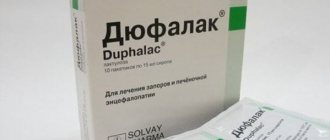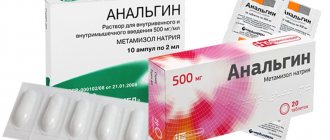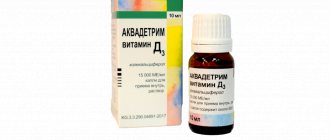Dysbacteriosis is a common occurrence for lactating women. Problems with the stomach and intestines arise due to decreased immunity after childbirth or taking antibiotics. Then there is pain and heaviness in the abdomen, flatulence, defecation disorders (constipation or diarrhea), mild nausea, etc. What medicine should be used to eliminate unpleasant symptoms and restore normal bacterial flora?
Bifidumbacterin is a drug from the group of probiotics, which includes beneficial microorganisms. Bifidobacteria normalize metabolism, strengthen the immune system, and normalize the natural microbial flora. How safe is the drug during lactation? More on this later.
Pharmacological properties of the drug
Bifidumbacterin has antibacterial properties against opportunistic bacteria, which activate their activity only under certain conditions. Additionally, the drug helps restore intestinal microflora, normalizes the functioning of the gastrointestinal tract, and serves as an immunomodulator (strengthens the body's defenses).
It is important to familiarize yourself with the cases in which this medication is prescribed:
- For therapeutic and prophylactic purposes for intestinal dysbiosis.
- For acute intestinal infections (staphylococcal enterocolitis, salmonellosis).
- To neutralize toxic substances in case of poisoning.
- For chronic constipation and indigestion due to long-term antibiotic therapy.
- For correction of microbiocenosis before and after surgery.
- As a prophylaxis for hospital infections in patients who often suffer from colds.
- As an adjuvant in the treatment of urogenital infections, including sexually transmitted diseases (gonorrhea, genital herpes, chlamydia)
- For bacterial vaginitis of various etiologies.
- For chronic colitis.
Properties
The probiotic “Bifidumbacterin” is based on special bacteria that, when released into the intestines, normalize its activity. Pediatricians recommend the drug for newborn babies in case of serious disorders of the digestive system, dysbacteriosis, and also to prevent the development of rickets. Among other things, this remedy is often prescribed to weakened infants suffering from diathesis or anemia. In addition, the product can help babies during the transition from breastfeeding to special formulas.
“Bifidumbacterin” is a complex restorative drug that allows you not only to get rid of digestive tract disorders, but also to acquire antibacterial microflora in relation to pathogenic organisms. In addition, this probiotic falls into the category of immunomodulatory drugs.
Use for intestinal colic
At the age of 3-6 months, the baby's intestines are just forming. Therefore, intestinal colic is the body’s reaction to difficulties in digesting food. This problem is relevant for both breastfed and bottle-fed babies.
There are a variety of drugs that affect the intestinal microflora. Disorders of the functioning of the gastrointestinal tract are also no less common. The nutritional function is fundamental for the baby: the general well-being of the child is directly related to the functioning of the intestines.
Bifidumbacterin is used in cases where there is a problem with improper colonization of the intestines with beneficial bacteria (for example, during delivery by cesarean section, low body weight of the child, or various intestinal infections that have affected the baby at home). The consequences of this problem can manifest themselves in the form of intestinal colic.
Bifidobacteria constitute the normal intestinal microflora of a child of the first year of life. To normalize the functioning of the gastrointestinal tract, bifid drugs are used, which are produced in aseptic packaging in powder form (can be dissolved in water or milk).
The dosage of the drug can only be prescribed by the attending physician (it all depends on the severity of the baby’s condition). Doctors recommend giving the drug at night to those children whose mother does not breastfeed at night. Under such conditions, the effect of the drug will be longer.
If you use Bifidumbacterin for colic, the therapeutic effect occurs within a week of systematic use: pain is eliminated due to decreased gas formation, and stool is normalized. Improvement in the condition may occur much earlier, but in any case you should not stop taking the drug.
There are other preparations containing bifidobacteria. Such products are produced abroad in the form of tablets and syrups, but such drugs are intended for older children. Domestic Bifidumbacterin has proven itself to be excellent for children under 1 year of age.
The drug has no contraindications or side effects. Allergic reactions of the body due to organic intolerance to the active components are excluded. But it is still not recommended to neglect the consultation of a pediatrician. After all, it may happen that the use of this remedy is not appropriate for your child. Additionally, the drug can provoke unexpected adverse reactions from the gastrointestinal tract.
Operating principle
The therapeutic effect of the use of “Bifidumbacterin” is determined by the antagonism of bacteria towards pathogenic and opportunistic microorganisms. Having penetrated the intestines, the beneficial substances of the drug begin to multiply intensively and resist harmful microbes. Thanks to the use of this medicine:
- the ratio of beneficial intestinal bacteria to harmful microorganisms increases;
- metabolic processes are normalized and nonspecific resistance to various pathologies is improved;
- normal production of essential niacin, biotin, vitamins B9 and K is ensured;
- the breakdown of fatty acids is accelerated, due to which the level of bad cholesterol in the blood drops significantly;
- the time it takes for pieces of food to pass through the esophagus is normalized;
- local immunity is activated;
- there is an increased resistance to the bacteria Helicobacter pylori;
- the harm caused by other medications taken is minimized.
Bifidumbacterin for newborns with colic
Intestinal colic is a common problem in newborns. The baby's digestive system needs time to adapt to the load of breaking down incoming food. And this is facilitated by beneficial bacteria that gradually colonize the sterile intestines.
If there are not enough microorganisms, nutrients are poorly broken down, and dysbacteriosis occurs. Pathologies are associated with: bloating, defecation disorders, skin problems, spasmodic colic. Probiotic Bifidumbacterin is a drug that promotes the formation of a colony of beneficial microflora. We will tell who and how to use it.
Why use
When a child is born, he becomes a real target for all kinds of microbes, parasites and viruses. But even despite the presence of good natural defenses in the body in the first weeks after birth, in reality there are many situations in which the baby’s immunity is destroyed. And such a failure certainly brings a lot of trouble. It is the digestive system that is most vulnerable. In such a situation, the best solution would be to introduce beneficial bacteria into it, which will help improve the functioning of the gastrointestinal tract.
True, pathogenic microflora often appears instead, which negatively affects the general condition of the child. As a result, terrible colic, bloating occurs, and the child herself becomes restless: she refuses food, often burps, and practically does not sleep. Against the background of this condition, the baby stops gaining weight. Almost always, the body of a newborn child independently copes with the problem that has arisen, producing a large number of beneficial bacteria, thus achieving the necessary balance in the digestive tract. It is noteworthy that the period of colic varies significantly among different children. For example, in babies fed breast milk, it occurs much earlier. It is worth saying that in case of dysbacteriosis, it is imperative to give Bifidumbacterin Forte to infants. This article will tell you how to do it correctly.
Bifidumbacterin: indications for use for colic in newborns
The miracle remedy specifically affects the cause of increased gas formation. By populating the intestines with bifidobacteria, the drug helps suppress pathogenic microflora that causes bloating.
In addition to improving digestion and normalizing metabolic processes, Bifidumbacterin also strengthens the body's immune forces.
The components of the probiotic are not absorbed in the intestines, so it is recommended for patients of any age, including newborns.
Intestinal colic is an indirect indication.
As a rule, Bifidumbacterin is prescribed for:
- infections that cause stool upset;
- dysbiosis;
- constipation associated with microflora imbalance;
- inflammatory processes in the intestines;
- rapid transfer to artificial feeding;
- antibiotic therapy for serious common infections (pneumonia, sepsis).
Bifidumbacterin is recommended for the prevention of intestinal disorders in weakened children, namely:
- premature;
- underweight;
- survivors of birth trauma;
- whose mothers suffer from chronic illnesses or have experienced severe toxicosis during pregnancy.
Bifidumbacterin during lactation
Nursing mothers often suffer from intestinal dysbiosis. Digestive disorders can occur due to inflammatory diseases of the digestive tract, overeating, and consumption of low-quality foods. Against the background of dysbacteriosis, metabolism is disrupted, harmful microorganisms multiply, an inflammatory process occurs, and immunity decreases. Therefore, there is a risk of infectious diseases.
Bifidumbacterin is taken for medical reasons when breastfeeding. The drug normalizes the bacterial flora of a nursing mother and does not harm the baby if the rules of administration are followed. Doctors say that it is not worth stopping feeding during treatment, since the drug can be used even by newborns.
Lactating women use the medication to treat diseases of the genital organs, such as candidiasis. Thus, Bifidumbacterin is allowed to be used for hepatitis B after a doctor’s permission. To avoid side effects in the child, a nursing mother must strictly follow the treatment regimen determined by the doctor.
Subscribe to our VKontakte group
Composition and release forms
The main component is Bifidobacterium bifidum. Bifidumbacterin Forte quickly creates a colony of beneficial microflora due to the fact that microorganisms are initially concentrated (sorbed) on activated carbon particles. They produce: tablets, capsules, powder, suppositories and lyophilisate.
Freeze-dried live bifidobacteria are released in vials and ampoules along with a nutrient medium of gelatin, sugar and lactose on which they were grown. These elements help beneficial microorganisms multiply faster.
The powder from frozen and dried bacteria, completely purified from the nutrient medium and additives, is packaged in laminated bags.
All forms are suitable for newborns, except tablet form. Mostly, pediatricians prescribe it in powder, which is easy to dilute and give to the baby with a pipette or adding to food.
Similar drugs
If there is an allergy to the components of Bifidumbacterin or hypolactasia in an infant, it is recommended to replace the drug with a safer one. The pharmaceutical market offers medications with similar effects:
These are drugs based on living bifidobacteria that inhibit the development of pathogens.
Many parents are interested in the question of which is better - Lactobacterin or Bifidumbacterin. Both drugs are probiotics based on living microorganisms. Only Lactobacterin contains lactobacilli, and Bifidumbacterin contains bifidobacteria. Probiotics act in almost the same way, but the latter drug is more often prescribed to infants, since there are more bifidobacteria in their intestines. The doctor will help you choose the right medicine and advise you on how to take it.
According to reviews, Bifidumbacterin labeled “Forte” is more effective, since it contains bifidobacteria adsorbed on activated carbon particles. The drug penetrates the digestive tract and exhibits a therapeutic effect faster.
Thus, Bifidumbacterin is an effective and safe probiotic agent that restores the intestinal microbial flora, normalizes digestion, and improves immunity. However, in order to avoid negative effects before using the drug, carefully study the contraindications. Bifidumbacterin is contraindicated in case of allergies to its components and hypolactasia. It is important to follow the dosage and treatment regimen determined by the pediatrician.
A newborn baby has an almost clean intestine. It does not yet contain the required amount of “good” bacteria that are necessary for digesting food.
The first beneficial microorganisms enter the baby's intestines along with mother's milk. But very often these bacteria are not enough for the normal functioning of the baby’s intestines. In this case, the body cannot cope with the food that enters it, and the child’s gastrointestinal tract is disrupted, dysbacteriosis and colic appear.
Then the drug Bifidumbacterin for children comes to the rescue. The drug Bifidumbacterin is an opponent of a wide range of pathogenic and opportunistic microorganisms; activates the digestion process and functions of the gastrointestinal tract, metabolic processes and nonspecific resistance of the body.
How to properly give Bifidumbaterin to a newborn?
Before starting therapeutic or preventive measures, you must consult with your doctor about which form is best to use in a particular case and how long you can use it.
It is worth noting that Bifidumbacterin is not a medicine that has an immediate effect. Often the effect appears after a week of regular use. Maybe faster, depending on how quickly a sufficiently large colony of beneficial bifidobacteria forms in the newborn’s intestines. But since the medicine affects the cause of colic, its effect is more lasting and reliable.
- Bifidumbacterin for newborns is dissolved in breast milk or formula . The final mass is heterogeneous, part of it is sediment. The suspension is given to the baby to drink from a spoon immediately after dilution. You should not prepare the solution in advance; the bacteria in it become active and die. Do not heat the liquid more than 40 degrees.
- It is better to store in the refrigerator without freezing.
- It is best to take the probiotic half an hour before feeding , but newborns can be given immediately before meals. The dosage and duration of use of Bifidumbacterin for newborns with colic should be prescribed by a doctor , taking into account all the accompanying circumstances.
- Typically, for the treatment of colic , 1 sachet containing 5 active doses is prescribed, 2-3 times per day. For preventive purposes, it is used in the same regimen, but at half the dosage.
- The course duration is usually 3 weeks.
How to give Bifidumbacterin to a baby
The probiotic is most often prescribed in bottles. This remedy is usually given along with mother's milk or a special mixture. There are many ways to use a probiotic, but it is advisable for infants to dilute the medicine when feeding.
Before you start using a probiotic, it is very important to study the included instructions in detail. It explains in some detail how to give Bifidumbacterin to infants in bottles. It is best to take the medicine 20-30 minutes before feeding.
Parents are often interested in how to give their infants “Bifidumbacterin” in ampoules. This product is also popular because it is very convenient to store and use. The correct dilution of the medicine is described in detail in the instructions. Each ampoule contains 5 dosages of bifidobacteria, each of which requires a teaspoon of liquid. In other words, each bottle will require 25 ml of boiled water, artificial formula or breast milk. The selected liquid must be added directly to the ampoule and shaken well. The resulting mixture should be given to the child immediately. To prevent the development of allergies, you should strictly adhere to the dosage recommended by your doctor.
No less often, pediatricians prescribe Bifidumbacterin powder to newborn babies. How to give this remedy to a baby? The contents of the sachet should be diluted with boiled water, formula or breast milk. Each sachet will require 25 ml of liquid. Mother's milk must first be expressed. It is worth considering that the temperature of the liquid should not exceed 40 degrees. Otherwise, the beneficial bacteria present in the drug will simply die. The prepared mixture should be given to the child about half an hour before meals.
In order to really rid a newborn baby of intestinal dysbiosis and its unpleasant symptoms, you should read the instructions, doctors’ recommendations and find out how to give Bifidumbacterin powder to your baby. Reviews from parents indicate the high effectiveness of this product and ease of use. Satisfied mothers say that even the youngest children take the medicine without problems, and their condition improves quite quickly. By the way, the easiest way, according to parents, is to give Bifidumbacterin to a breastfed baby. As practice shows, it is with mother's milk that babies take the drug with the greatest pleasure.
Knowing how to give your baby “Bifidumbacterin” powder, you can easily get rid of all the problems with your baby’s intestines. By the way, for greater convenience, when feeding a baby, you can use syringes without needles or pipettes. This useful advice will certainly come in handy for mothers whose children are often capricious and refuse to put a spoon in their mouth.
If the child can already take capsules and tablets, then he should be given warm water or some fermented milk product to drink. If the baby is not yet able to swallow such a medicine on his own, its shell must be cut, and the powder inside must be mixed with a teaspoon of boiled water. This mixture should be given to the child without waiting for dissolution.
Of course, parents should also know how much Bifidumbacterin to give their infants. In general, the single dosage depends on the reasons for prescribing the medicine. For prevention, it is recommended to use 1 ampoule, 1 capsule or 1 sachet of powder. But if acute bacterial infections of the intestines are detected at a time, the child may need up to 5 bottles, tablets or sachets of medicine.
Most often, parents resort to the use of probiotics in case of diarrhea in young children. Before using the medicine, it is very important to find out how to give Bifidumbacterin to a baby with diarrhea. After all, diarrhea is one of the manifestations of acute dysbiosis and other problems in the intestines. In such a situation, the use of suppositories is, of course, excluded, and the use of tablets and capsules, as a rule, has to be abandoned due to the patient’s young age. For diarrhea, probiotic powder and ampoules are considered the most effective. This remedy acts the fastest and is much easier to use compared to other types of the drug. This is why pediatricians recommend these forms of probiotics.
How often can you give Bifidumbacterin to your baby? Typically, the pediatrician prescribes three or two doses of the medication, but six times a day may also be acceptable.
How many days should I give Bifidumbacterin to my baby? The duration of use of the drug depends primarily on the baby’s health condition.
If the product is used as a prophylaxis, it is enough to give the child one sachet for 7-10 days.
The dosage of the liquid suspension is determined by the age of the child. How much can you give Bifidumbacterin to a baby? Up to six months of age, infants are recommended to use triple dosages 3 times a day.
As for rectal suppositories, they should be placed once before bedtime.
The duration of therapy using a probiotic can be a maximum of 3 weeks. Then a break is taken for at least a month. And if necessary, the pediatrician will prescribe a second course of treatment. By the way, it is still better to ask your doctor about how much Bifidumbacterin to give to your baby.
Contraindications and side effects
Bifidobacteria are normally absorbed by the human body at any age.
Individual sensitivity can only manifest itself to the components of the nutrient medium contained in ampoules and vials. The named release forms are not suitable for children with lactose intolerance. For this diagnosis, purified powder in bags is recommended.
If, with regular use of a probiotic, the child continues to be bothered by colic, stool retention occurs, and signs of allergy are recorded, it should not be used. It is necessary to consult a doctor about changing the drug.
Scope of application
Instructions for use of Bifidumbacterin include the following indications for use:
- intestinal dysbiosis, provoked by taking antibiotics, stress, potent hormonal drugs;
- microflora imbalance caused by concomitant diseases (cholecystitis, pancreatitis, gastritis, etc.);
- acute intestinal infection (caused by staphylococcus, salmonella and shigella);
- prevention of intestinal microflora disorders (bloating, flatulence, colic, constipation);
- constant use in newborns and babies up to 12 months who are bottle-fed.
For more information on how to get rid of colic, see the course Soft tummy>>>
Bifidumbacterin for newborns for constipation is prescribed very often, especially for premature babies or babies born as a result of cesarean section.
Reviews from parents
In April 2015, a daughter was born. From the first days there were problems with milk (lactostasis). I had to switch to artificial feeding. In the process of selecting formula for the newborn baby, she was constantly tormented by colic, and problems with stool began. We tried adding children's Linex to the diet - without results. It seems that the mixture was chosen, Nestazhen suited us, but we couldn’t cope with constipation without Microlax (a laxative).
After reading a lot of articles about prebiotics (even Kharkevich’s pharmacology), I came to the conclusion that it’s not worth chasing the price, so we decided to try the usual Bifidumbacterin. As a matter of fact, within a week of taking it, the stool returned to normal, became formed and regular. They also forgot about colic.
The first time I used Bifidumbacterin was when my baby was only one month old. We were tormented by our tummy and colic. Very helpful. I mixed the powder with breast milk. There were no allergies.
The second time was used at five months, when I fell ill with ARVI. The prescription was received from a doctor, a plus for complex therapy. Took one sachet 3 times a day for 5 days. He helped us.
I am a mother of two children and for me Bifidumbacterin is just a godsend. He was recommended to us by a very good pediatrician. I use it for dysbiosis and intestinal disorders. I also make sure to give a course of the drug after using antibiotics. I usually mix the drug with formula or just water and give it to the child. It helps us very well, I usually notice visible results after 2-3 days.
The drug has been used many times. We started using it in the maternity hospital, since our daughter was premature. The doctor attributed the intake to unformed intestinal microflora. Took it for about two months, adding it to the mixture. Then we were always prescribed it after using antibiotics for several days. They did not take it on their own. There was no allergy to the product. Overall, I doubt it will do any good, but it didn’t do any harm either.
Irina, Krivoy Rog.
The doctor prescribed this drug because the baby had constipation. From 4 months, as soon as I started introducing the first complementary foods, problems with my tummy began. I gave 1 packet 2 times in the morning and in the evening. The child drank without problems, diluted it in water and gave it from a spoon. The doctor told me to take it for a week, but there was no improvement. I independently decided to extend it according to the instructions - the course is 3-4 weeks. And already from the second week everything returned to normal. I didn’t give it for 3 weeks, but a month later the course was repeated. We were also prescribed it during illness, when we were taking antibiotics.
Reviews
Parents' opinions about the drug "Bifidumbacterin" are mostly positive. Parents say that the product quickly stabilizes digestive functions and easily copes with constipation, diarrhea, flatulence, bloating and other signs of intestinal dysbiosis. In addition, children usually tolerate the drug well. And all sorts of side effects from the use of Bifidumbacterin, according to parents, are extremely rare. An important advantage of the drug is its affordable cost, which is slightly lower compared to similar medications.
All sorts of problems with stool can completely disappear if you use a probiotic correctly. And for this it is very important to know how to give “Bifidumbacterin” to infants and older children. After all, only if used correctly, this drug will really benefit the body of a newborn baby.
The importance of this medicine for newly born babies is difficult to overestimate. The type of beneficial microorganisms present in this preparation is considered the main one in the microflora of the baby’s digestive system. It is thanks to this property that “Bifidumbacterin” allows you to quite quickly compensate for the lack of beneficial bacteria in the baby’s intestines. According to the instructions, side effects from using the drug have not yet been identified.
As for contraindications, these include only individual lactose intolerance, which can provoke an allergic reaction. Only in this case is it prohibited to use “Bifidumbacterin” to treat infants.
Using probiotics to treat colic in children - does it make sense?
Often, very often, mothers, in response to a complaint about tummy problems with their baby, receive a recommendation to “give him bifiform.” Or espumizan. Or anything else from this category. But does this make sense? Let's see what evidence-based medicine says (that's the kind that tests how certain medical techniques actually work).
Probiotics are live microorganisms that, when added in sufficient quantities, should have a positive effect on the intestinal microflora and thereby reduce problems not only with children’s, but also with adult tummies (but we are specifically interested in babies in the first months of life). Sometimes they are confused with prebiotics - these are substances that stimulate the growth of their own beneficial bacteria. Both are found in abundance in mother's milk, which in itself is the main pre- and probiotic for babies! In general, healthy microflora in babies depends on two main factors:
1) method of delivery: the microflora of a baby born by cesarean section does not differ for the better from the microflora acquired during passage through the maternal birth canal;
and 2) method of feeding: breast milk provides the child with unique protection and assistance in the formation of the microbiome, which no other food can provide, and formula, of course, too - many specific components of breast milk are not only not artificially reproducible, but also cannot be preserved for long deadlines. In human milk, about 8% is oligosaccharides - natural prebiotics that stimulate the growth of bifidobacteria and lactobacilli in the baby's gastrointestinal tract.
At the same time, even with the help of breast milk, the baby’s microflora in the first months (usually about 2-3 years of life) is very unstable. Its main enemy, as you might guess, is antibiotics. It can also be negatively affected by hospital flora (if the baby had to spend too long in a maternity hospital or hospital for treatment), and such an absolutely banal moment as supplementing with large volumes of water, for example (and for a newborn baby, 100 ml of water is quite a large volume). Therefore, the initial period of microflora formation does not always go smoothly, and clearly more than half of the parents encounter problems such as churning in the tummy, very unstable stools, and gas. And this is where they are offered as a solution to the problem: we give probiotics.
Bifidobacteria during breastfeeding
The importance of proper functioning of the digestive system in general and the intestines in particular cannot be overestimated. Most nutrients are absorbed there - therefore, when the intestines do not work properly and the body lacks energy, bad mood, weakness and ailments are guaranteed.
This did not bypass newborns either - for barely born babies, the proper functioning of the gastrointestinal tract is no less important than for adults! At the slightest disruption in his work, the baby will develop bloating and colic, which causes a lot of anxiety for both him and his parents.
The work of the gastrointestinal tract is based on the interaction of bacteria. Entering the body with mother's milk, beneficial bacteria form colonies and protect their habitat from uninvited guests: they envelop the intestines with a protective film that promotes proper intestinal function, and help form nerve endings for receiving food other than milk or infant formula.
However, when there are not enough beneficial bacteria in the body, the baby begins to experience spasmodic colic. The food that enters the body does not have time to be completely processed, it begins to ferment and release gas bubbles, causing a painful reaction.
It is important that there are enough bacteria in the child’s intestines: the slightest lack of them will lead to spasms, vitamin deficiency, dysbacteriosis and other unpleasant conditions that will have to be treated.
The activity of the gastrointestinal tract affects the entire body of a small person, so its proper functioning is the key to your baby’s health. And when there are not enough beneficial bacteria in it, Bifidumbacterin for newborns and infants is the first assistant. The active component of the drug is Bifidobacterium bifidum.
How is Bifidumbacterin useful for children?
This wonderful drug based on bifidobacteria will be a real salvation for a child who has problems with the digestive system.
The living microorganisms in its composition are identical to the beneficial bacteria in the human intestine; when they enter the body, they will begin to perform their function: cover the intestines with a protective film, develop nerve endings for the absorption of useful substances, and fight pathogens.
The drug Bifidumbacterin will quickly eliminate most of the problems that arise in the baby’s gastrointestinal tract: dysbiosis, colic, lack of nutrients, which can even lead to rickets. It will be equally useful to prescribe such a drug to babies with anemia and diathesis, as well as to children switching to a new diet: for example, from breast milk to infant formula.
However, it is important to note that bifidum bacteria should not be used as a prophylaxis for newborns and infants: the drug is prescribed exclusively by a pediatrician for serious abnormalities in the gastrointestinal tract, when the improper functioning of microorganisms becomes the cause of disease and illness.
You cannot prescribe Bifidumbacterin for children on your own!
If your baby has everything in order with beneficial bacteria, and you start giving him the drug, then this can provoke dysbiosis due to their oversaturation.
Bifidumbacterin, in addition to bifidobacteria in the composition, can also have an antibacterial effect on pathogenic bacteria. Thus, this drug not only normalizes the functioning of the gastrointestinal tract, but also restores the immune system.
The drug is available in several different forms:
- dry Bifidumbacterin - powder in bottles and foil bags;
- liquid Bifidumbacterin in ampoules;
- in capsules;
- in tablets;
- Bifidumbacterin suppositories.
For newborns and infants, it is recommended to use the drug Bifidumbacterin, produced in liquid form, as well as in the form of powders or suppositories.
Bifidumbacterin or Bifidumbacterin Forte for newborns - which is better?
Bifidumbacterin Forte is considered an improved drug. It is distinguished by the biomass of living bifidobacteria adsorbed on stone activated carbon. This allows the drug to act faster once it enters the intestines. Therefore, undoubtedly, for serious diseases it is better to use Bifidumbacterin forte.
Bifidumbacterin: instructions for newborns
Of course, Bifidumbacterin should be prescribed to newborns and infants purely individually, depending on the state of the baby’s digestive system: this should be monitored by a pediatrician. His task is to prescribe a suitable dosage regimen.
Depending on the child’s condition, the doctor may prescribe from 2 to 5 doses 1-3 times a day. The duration of the course is up to 21 days, it can be repeated after 1 month.
Parents should know that the tablet and suppository each contain 1 dose of the drug, other forms of the drug contain 5 doses each.
It is advisable to take the medicine half an hour before meals, or 1 hour after. That is, to achieve maximum effectiveness, the drug should be taken on an empty stomach.
In the case of infants, this is quite difficult to achieve. Therefore, it is permissible to dilute Bifidumbacterin for newborns with milk.
For bottle-fed infants, Bifidumbacterin powder can be added and diluted together with powder mixtures.
Dry Bifidumbacterin - how to dilute?
The powder should be poured into a small container, then boiled water should be added at the rate of 5 ml per 1 dose (one sachet contains 5 doses). The product must be mixed thoroughly, wait about 10 minutes for maximum dissolution (the drug does not dissolve completely).
Source: https://okishechnike.com/info/bifidobakterii-pri-grudnom-vskarmlivanii/
Forms and composition
In the first weeks of a baby’s life, until his gastrointestinal tract is occupied by beneficial microorganisms, there may be a disorder due to harmful bacteria. Therefore, the baby begins to have bloating and colic.
The task of bifidumbacterin is to normalize the intestinal microflora. After all, this drug contains the necessary viable bacteria and a nutrient medium for them. Once they enter the body, they create their own colony there, neutralizing the pathogenic flora. In the medicinal product, bacteria are stored in a dry state - in the form of a powder. It is produced in ampoules, bottles, sachets, capsules. There are also rectal and vaginal suppositories.
Attention! This drug in powder form cannot be stored for a long time after opening the package. Otherwise, you can simply poison the baby.
A little information
Among modern probiotics that stabilize the intestinal microflora of a recently born baby, Bifidumbacterin boasts a large number of positive responses. How to give this drug to a baby without harm to his health, in what dosage and for how long? All these questions can be answered not only by a doctor, but also by the instructions included with the medicine.
This probiotic can be really important, especially if your baby was born by C-section. Due to the presence of a huge number of active bacteria in the product, “Bifidumbacterin” helps stabilize the functioning of the digestive system. And reviews from satisfied parents only confirm the effectiveness of this product.
Indications for use
Most often, colic affects children whose mothers suffered from infectious diseases during pregnancy or have a history of diabetes. Also, intestinal problems are observed in infants born prematurely, injured during childbirth, and having low weight. But after 3 months, the functioning of the gastrointestinal tract should normalize itself, the maximum period is a year.
To help the child and his parent survive this difficult period, the doctor may prescribe bifidumbacterin. Most often this medicine is prescribed for the following indications:
- dysbacteriosis;
- intestinal infections;
- inflammation or disruption of the intestines;
- bottle-fed newborns;
- after treating sepsis or pneumonia with antibiotics;
- constipation.
Experienced mothers claim that after just a week of taking bifidumbacterin, the baby’s colic goes away, it’s easier for him to walk “in a big way,” and the amount of gas is reduced. As a result, the child eats and sleeps better. But doctors warn that this medicine cannot be used once. Only a course of treatment will be effective.
Is it possible to give Bifidumbacterin to infants?
Most often, dysbiosis manifests itself in children suffering from all sorts of developmental pathologies. For example, in premature babies who were injured at the time of birth, who weigh too little, or those babies whose parents suffer from chronic infectious and inflammatory defects. If dysbiosis manifests itself with a pronounced clinical picture, then the child must be given medications that contain enzymes that promote complete digestion of food. These substances help reproduce beneficial bacteria in the baby's intestines. Once the balance of bifidobacteria in the child’s digestive tract is achieved, he will no longer suffer from all sorts of symptoms of the pathology.
Should infants be given Bifidumbacterin? In fact, this drug is a kind of first aid for abdominal pain in newborns. That is why questions about whether Bifidumbacterin can be given to infants are inappropriate, because this product was originally created just for them. Pediatricians often prescribe this particular probiotic for severe colic in a newborn baby. After a week-long course, mothers note that their babies are feeling much better: they stop screaming for no reason, crying at night, and squeezing their legs. The baby stops being capricious and irritated, begins to eat with great appetite and walks with pleasure.
How long can you give Bifidumbacterin to your baby? It is very important to use a probiotic not as a one-time aid, but regularly, for a sufficient amount of time. This is the only way to achieve a good result in the process of getting rid of colic and normalizing the intestinal microflora. During a properly selected course of treatment, the functioning of the newborn baby’s digestive system stabilizes, and the child’s general condition becomes much better. In addition, the effect of this drug has a wider spectrum than simply eliminating colic and removing gases from the body.
It is worth noting that unpleasant symptoms will bother the baby in the first days of probiotic treatment. That is why during this period parents should resort to some kind of auxiliary means aimed at eliminating colic. But after the balance of bifidobacteria in the baby’s intestines is restored, the problem of gases and other troubles will also fade into the background.
Contraindications
Bifidumbacterin has virtually no contraindications, so taking it very rarely has negative consequences. This can only happen with allergies or individual intolerances. Children may also react poorly to bifidumbacterin if they have problems producing lactose. In this case, this remedy is not prescribed.
If you follow the instructions, bifidumbacterin will help improve the functioning of the newborn’s gastrointestinal tract and normalize its intestinal microflora. Colic and bloating will go away. The main thing is not to engage in amateur activities, but be sure to consult with a pediatrician or neonatologist.
Bifidumbacterin for newborns: instructions for use, for older children
The intestines of an infant are not ready for heavy loads, food does not have time to be digested, and colic occurs. Bifidumbacterin for newborns helps normalize microflora and eliminate dysbacteriosis.
When is Bifidumbacterin prescribed?
This drug contains microscopic organisms that stabilize the gastrointestinal tract. Pediatricians advise taking the medicine in the following cases:
- Dysbacteriosis. Lack of essential bacteria in the intestines.
- Gastrointestinal disorders. When the baby suffers from constipation or diarrhea.
- Colic. The baby cannot sleep peacefully due to spasms.
- Diathesis. A skin rash indicates problems in the digestive system.
- Prevention of rickets. To prevent the development of complications.
- Transition from breastfeeding to formula. The body is undergoing restructuring, and the baby needs beneficial bacteria.
- Taking antibiotics. They negatively affect the digestive system, eliminating beneficial bacteria. "Bifidumbacterin" will compensate for this lack of microorganisms.
- Frequent regurgitation. To normalize the functioning of the gastrointestinal tract.
- Lack of weight. The drug is prescribed to premature babies.
This is a complex medicine that has a positive effect on intestinal flora. It gives the baby the missing bacteria and at the same time fights pathogenic microorganisms. This is an immunomodulatory drug.
Bifidumbacterin is recommended to be taken for diathesis
Release form
“Bifidumbacterin” is found in pharmacies in different forms: tablets, suppositories, ampoules, foil bags. What should parents choose?
- Powder. Doctors often prescribe dry Bifidumbacterin for infants. The powder contains bacteria. It is easy to dilute in water and give to children from a spoon or pipette. The solution is colorless, odorless and tasteless. Perfect for little ones who don't like bitter medicine. The medication removes more than 10% of dead bacteria from the gastrointestinal tract. Sold in foil bags or glass bottles.
- Ampoules and vials. They contain microorganisms that have been vacuum dried and processed into a jelly-like mass that feeds the bacteria. The instructions say that one ampoule or vial contains five doses of the medicine, each containing 10 * 7 microbial cells.
This form of the drug is excellent for infants if they do not have lactose intolerance. Once in the intestines, microscopic organisms with feeding jelly multiply faster than their powder counterpart. They quickly master new “territories” and help the child’s gastrointestinal tract. Parents are required to open the container and pour the contents into a pipette or plastic dispenser syringe.
- Tablets and suppositories. They are rarely prescribed for newborns; they are intended for adults and children over one year old.
Doctors often prescribe dry Bifidumbacterin for infants
“Bifidumbacterin” dry or liquid?
Sometimes infants experience colic and gas formation due to the drug in ampoules or vials. Milk sugar is to blame for feeding bacteria, because healing granules contain lactose. It accelerates the spread and development of beneficial microorganisms.
Lactase, which is responsible for the processing and absorption of this sugar in the body, is present in newborns in minimal quantities or completely absent. After all, the baby is born with a sterile intestine. This is the cause of allergies. Therefore, experts recommend giving babies a powder version of the drug, which does not contain milk sugar.
Its analogue in ampoules and vials is suitable for older boys and girls, after one year.
If you want to purchase Bifidumbacterin for newborns, choose powder in individual sachets or bottles. It's convenient and safe.
Bifidumbacterin is given to newborns on an empty stomach
How to give Bifidumbacterin to babies
So, for very small toddlers, it is better to choose bacteria in powder form. But how to get a baby to take medicine? How many grams of dry matter should a baby take? To answer these questions, please refer to the instructions for use of the drug.
The dosage regimen is prescribed by a pediatrician who has been monitoring the baby since birth. Bifidumbacterin is given to newborns on an empty stomach. This can be done 30 minutes before meals or 60 minutes after.
For infants, the dry drug is diluted in milk expressed from the mother. If your child is bottle-fed, the medicine is added to the mixture.
You can dilute the drug in boiled water. The instructions indicate that the medicine should be dissolved in 5 ml of water. Pour one teaspoon of warm water into the container with the powder and mix thoroughly. The solution is ready!
The prepared suspension cannot be stored! The remains of an open ampoule or sachet can be stored for no more than one day.
For babies under six months of age, give the medicine 1 sachet three times a day. This is the standard dosage. It is indicated in the instructions for use. The duration of treatment depends on the child's condition. It is determined by the doctor. Usually it is three weeks. This is followed by a thirty-day break, after which it is better to repeat the course.
For infants, the dry drug is diluted in milk expressed from the mother.
The liquid concentrate is sold in bottles. It is convenient to draw the drug using a medical syringe. At the same time, the upper iron lid is opened, then the rubber pad is pierced with a needle. The needle remains in this position, while the syringes are changed. The syringe contains the medicine that is given to the baby.
"Bifidumbacterin" is compatible with breastfeeding. Both mother and baby can drink it.
Similar drugs
Among a number of analogues of Bifidumbacterin, the drug Linex stands out. It contains enterococci and lactobacilli plus lactose. One dose of the medicine contains 1.2 * 10 to the seventh power of vacuum-dried live bacteria. This figure is equal to the number of the same microorganisms in kefir. “Bifidumbacterin” contains 10 units of bacteria to the eighth power.
Among a number of analogues of “Bifidumbacterin”, the drug “Linex” stands out
Powder "Bifidumbacterin" and "Linex" are very similar. But liquid “Bifidumbacterin” has a number of advantages.
It begins to act faster than its “colleagues”, because microscopic organisms are not in hibernation. They are active and ready to work. Dried bacteria need time to “wake up”.
The liquid drug here wins in speed.
Analogs also include the following drugs:
- "Bifinorm";
- biological mass of vacuum-dried bacteria;
- "Lactobacterin";
- "Profibor".
Sometimes the doctor prescribes Bifidumbacterin forte. It contains an increased number of bacteria. Doctors recommend taking Forte dosage for weak children:
- premature babies;
- babies whose mothers suffered infectious diseases during pregnancy.
If the doctor prescribed Bifidumbacterin Forte to your child, there is no need to panic. An experienced pediatrician always knows what he is doing.
In case of lactase deficiency, taking Bifidumbacterin is prohibited
Contraindications
Some children do not tolerate Bifidumbacterin well due to allergies, but this happens quite rarely.
Bifidumbacterin is not recommended for newborns who are intolerant to the following components:
- Lactose. This is the sugar found in dairy products. Lactase deficiency is a disease that is quite common these days. Vivid symptoms are frequent loose stools with a sour, unpleasant odor or, conversely, constipation. Bloating, poor sleep, weight loss. In case of lactase deficiency, taking Bifidumbacterin is prohibited.
- Calcium stearate. This is an auxiliary ingredient in the preparation, giving it the desired consistency. The reaction to it is extremely rare.
- Dried starch. An allergy appears to it if the child’s body has not learned to properly digest complex carbohydrates.
How much does the drug cost?
This medicine has a relatively low price. “Bifidumbacterin” costs from 90 to 250 rubles, depending on the number of doses.
If you have a baby in your home, purchase a box of the product in advance, and in case of painful colic, constipation or diathesis, it will be at hand.
The affordable price will save your family budget. The main thing is to carefully read the instructions.
A well-functioning intestine is the key to a child’s health. Take care of the bacteria that help your little body digest food.
Source: https://LechimKrohu.ru/lekarstva/bifidumbakterin-dlya-novorozhdennyh-i-starshe.html
Features of the formation of the correct microflora in a child
The importance of this medicine for newly born babies is difficult not to appreciate. The type of microscopic creatures present in this particular preparation is the main one in the baby’s intestines.
Everyone knows that a born baby is immediately sent to his mother or father on his stomach (for example, during a caesarean section) - this is how the baby gets to know the microflora of his family for the first time. That’s when the process of populating the body with millions of different microbes and bacteria begins.
After lying on the mother's chest, the child is put to the breast and the gastrointestinal tract is populated with microorganisms that are useful and necessary for the child's body. Colostrum is called the first, natural “vaccination” for a child.
There are many reasons why the normal initial balance of microorganisms living in the intestines is lost. It is extremely important to compensate for the deficiency of bifidobacteria. More information about bifidobacteria for newborns>>>
This can be done with the help of Bifidumbacterin. The instructions for newborns (in ampoules or sachets) state that no side effects have been identified for this medicine.
An overdose of bifidobacteria is impossible; in addition, microorganisms are absolutely harmless to humans at any age.
However, if lactose intolerance is present, patients should refrain from taking the medication.
Rules of administration for babies: dosage, course duration
To find out how to give Bifidumbacterin to a newborn, you should also refer to the instructions. For small babies, the standard course to restore microflora lasts about a week, although doctors often insist on taking the medicine for 30 days.
Repeating treatment may be justified by the lack of the expected result and performed a couple of weeks after the first therapeutic course.
How to dilute Bifidumbacterin for a newborn?
If you use the drug in dry form, then the contents of one sachet must be mixed with 30 ml of boiled water. You can add Bifidumbacterin to breast milk or formula for feeding. For newborns and toddlers up to six months of age, one sachet is prescribed per day.
At the same time, it is undesirable to dilute the entire package at once, since bifidobacteria in a “cooked” form do not live long. The contents of the package can be divided into 3-4 times.
Children over 6 months to 3 years old should take 2 to 4 sachets per day per day. Meanwhile, this dosage of Bifidumbacterin is considered optimally applicable only for preventive purposes.
During treatment, doctors prescribe the medicine in double volume. The maximum dosage – up to 8 packets per day – is possible for adults and children over 7 years of age.
It is extremely important to use non-hot water when diluting the medicine.
If the temperature of the liquid exceeds 40 degrees, there is a possibility that all active microorganisms in the Bifidumbacterin preparation will die.
In undiluted form, the medicine must be stored in the refrigerator; however, the prepared solution cannot be saved; it must be used immediately.
If for some reason it was not possible to take Bifidumbacterin with food, you can do it at another suitable time. However, you should adhere to the medication dosage regimen specified in the instructions.
For newborns, the drug is given every 8 hours during the first 3 days of treatment. In the future, the interval between doses of the medication is gradually reduced to 4 hours.
What is the effect of Bifidumbacterin?
This drug is intended to optimize the balance of the intestine when it lacks certain microorganisms. Bifidumbacterin Forte is prescribed to children to normalize intestinal function, restore intestinal microflora, and, among other things, it has immunomodulatory properties. Therefore, such a medicine does not cause harm, but only has a positive effect on the body of children.
This drug contains live bifidobacteria. The fact is that when the baby is in the womb, his intestines remain sterile, and after birth the organ receives microflora similar to the mother’s. Bifidumbacterin is prescribed to newborns to help the development of the required amount of E. coli, lacto- and bifidobacteria. In addition, this product controls the activity of such microorganisms.
Problems with children's intestines occur as a result of insufficient bacteria or if they behave incorrectly. Bifidumbacterin Forte, due to its composition, has a mild and, most importantly, natural effect on the organ. Beneficial microorganisms are artificially populated into it, which help to absorb all nutrients well, and most importantly, correctly. Therefore, you can start taking this drug from the first day of birth.











